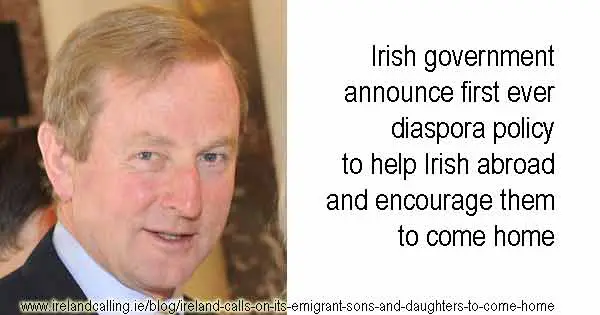The Irish government has produced its first ever policy for the diaspora, and it wants emigrants to come back to Ireland.
The policy is called Global Irish and looks at ways the government can connect with the people who have left Ireland. It says that the diaspora is both ‘an asset and a responsibility’ that requires a ‘sustained, long term effort’ when engaging with it.

It also looks at ways to support Irish people abroad who are in need of assistance.
The report has been launched by Taoiseach Enda Kenny, Tánaiste Joan Burton, Minister for Diaspora Affairs Jimmy Deenihan and Minister for Foreign Affairs and Trade Charlie Flanagan.
Mr Kenny said: “Emigration has a devastating impact on our economy as we lose the input of talent and energy. We need these people at home. And we will welcome them.”
The report includes plans for welfare projects to support vulnerable Irish people abroad. It identifies specific groups as being in particular need of support – people suffering isolation, depression and other mental health difficulties, as well as aging communities in ‘Irish’ areas of the UK and US and also Travellers, prisoners and the undocumented Irish in the US.
Another aspect of Global Irish is to support cultural projects such as Irish sport, music, dance, literature and language. Business networks to connect Irish professionals and companies worldwide will also be a priority.
Irish emigrants and community leaders abroad will be invited to the first ever ‘Global Irish Civic Forum’ to discuss the challenges they face.
People looking to leave Ireland will have access to a wealth of information about popular destinations for emigrants and Irish organisations and networks thanks to a new Global Irish” online hub on the Department of Foreign Affairs website.
The hub will also have information on returning to Ireland and what training and job opportunities will be available to them.
Mr Kenny predicted that 2016 will be the first year in which more people move back to Ireland than leave the country.
The policy review began in 2013 and received over 130 submissions from individuals and organisations with an interest in diaspora issues.